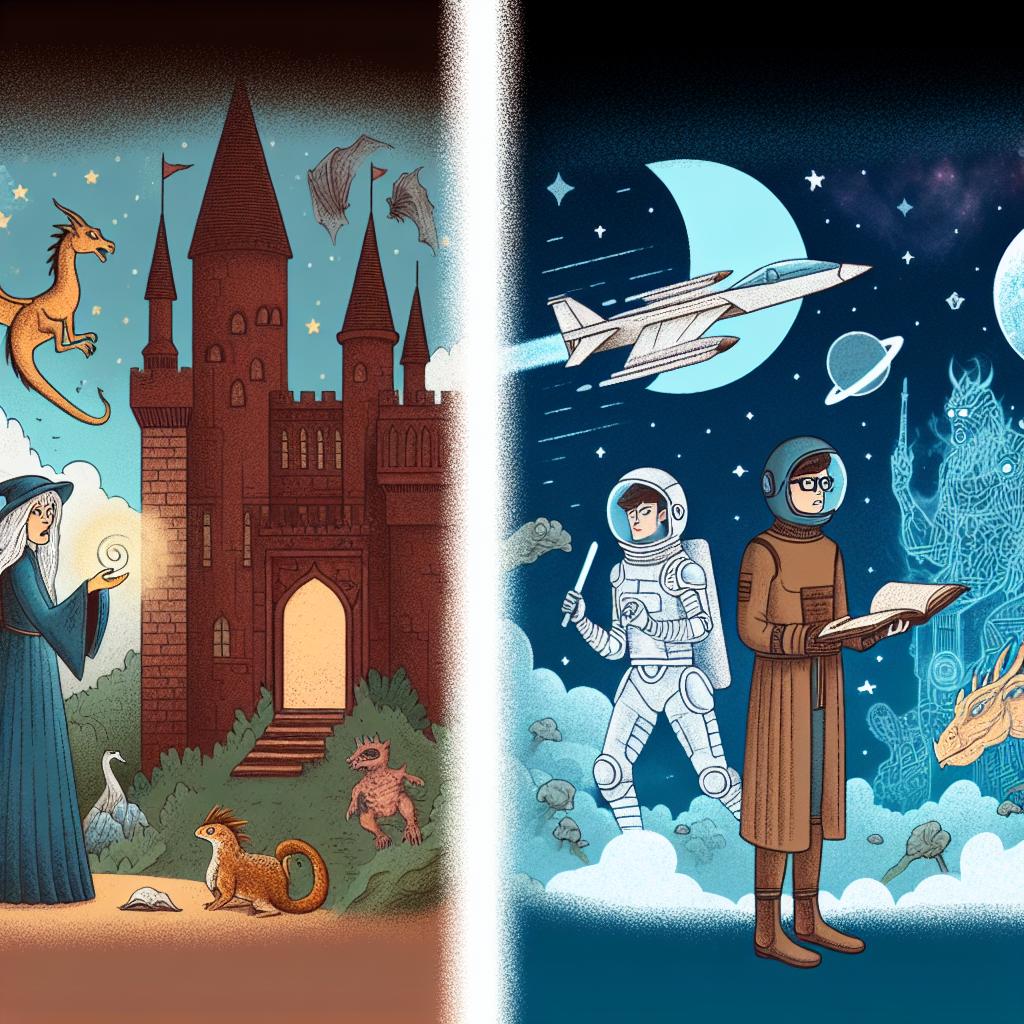How Fantasy Differentiates from Science Fiction

Understanding the Distinctions Between Fantasy and Science Fiction
In the realm of speculative fiction, fantasy and science fiction are two prominent genres that often garner significant discussion regarding their differences and similarities. Both genres provide readers with a chance to explore worlds that differ from reality; however, they do so through distinct methods and thematic concerns.
The Role of Setting and World-Building
Fantasy is typically characterized by worlds that operate on magical principles. These settings often include mythical creatures, enchanted items, and medieval societies. Examples include J.R.R. Tolkien’s Middle-earth and C.S. Lewis’s Narnia. The presence of magic or supernatural elements, which do not exist in the real world, is a hallmark of this genre. The methods of world-building in fantasy often involve the creation of entire mythologies and cultures, filled with unique customs and histories, allowing a deep dive into a different realm with its own logic and rules. In this sense, readers are invited to suspend their disbelief and immerse themselves in the fantastical and the impossible.
Conversely, science fiction hinges on scientific or technological advancements to construct its worlds. These settings are often futuristic or feature alternate realities based on scientific theories. Classic examples include Isaac Asimov’s depiction of robotics in his Foundation series and Arthur C. Clarke’s exploration of space travel in “2001: A Space Odyssey”. World-building in science fiction is more grounded in logical extrapolations of scientific principles. The genre aims to speculate about the future or alternate realities, based on scientific knowledge that is comprehensible, if not entirely probable, to the reader. This speculation often serves to focus on the implications of scientific discovery and technological advancement.
Themes and Narrative Focus
Thematically, fantasy often explores heroic quests, good versus evil, and character development within a moral framework. It tends to focus more on personal and moral journeys, often using its fantastical elements as metaphors for real-world issues. Heroes embark on journeys not just across physical landscapes but also towards moral and ethical maturity. The challenges they face are often external representations of internal or societal conflicts, reflecting the timeless battle between light and darkness, hope and despair.
In contrast, science fiction traditionally addresses societal, ethical, and philosophical questions related to current or anticipated technological changes. Authors use speculative societies or future technologies to examine the potential impact on humanity and the universe, prompting readers to reflect on questions of existence, identity, and the future. Science fiction often challenges the reader to consider the implications of human advancement and the responsibilities that accompany them. The genre can serve as a mirror, reflecting contemporary societal anxieties and ambitions back to its audience, thereby functioning as a form of social critique.
Use of Characters and Archetypes
Both genres make extensive use of archetypes, but their origins and functions differ. Fantasy characters often include archetypal figures such as the noble hero, wise mentor, and dark antagonist. These characters are deeply rooted in myth and folklore, serving as representations of universal human experiences and struggles. Their roles are often defined by the journey and the growth they experience. The interactions and transformations of these characters often emphasize moral lessons and human values, and their stories might draw on ancient mythologies and legends to give depth to character arcs and narrative outcomes.
Science fiction characters, while sometimes following similar archetypes, are more often used to represent ideas or serve as conduits for exploration of speculative concepts. Characters in science fiction may be artificial intelligence entities, extraterrestrials, or enhanced humans, reflecting their thematic emphasis on the implications of scientific progress. These characters function to reveal the narrative’s ideological questions, often embodying disparate perspectives on technology and its consequences. The very essence of personhood can be challenged within the science fiction genre, leading to narratives exploring autonomy, identity, and existence in evolving and unfamiliar contexts.
Conclusion
While fantasy and science fiction both offer escapism through speculative storytelling, their differences lie in their foundational elements: fantasy relies on the magical and mythological, while science fiction is rooted in the technological and scientific. These distinctions shape not only their worlds and characters but also the themes and narratives they explore, granting each genre its unique approach to questioning and expanding human imagination. Fantasy beckons to the mythical and the dreamlike aspects of imagination, where magic defines the boundary of possibility. Science fiction, on the other hand, challenges readers to envision futures and possibilities shaped by advancements and discoveries, inviting inquiry and reflection on the trajectory of human capability and technology. Readers may find joy and inspiration in both genres, as they each create distinct dialogues with the unknown and the unexplored, enhancing our understanding of both the otherworldly and the not-yet-realized aspects of existence.
Comments are closed.
Comments on 'How Fantasy Differentiates from Science Fiction' (0)
Comments Feed